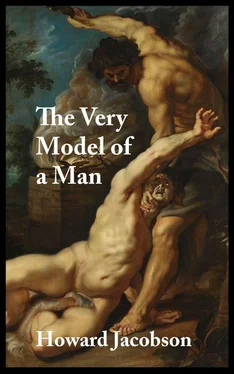He — HE — had not bothered us for some time. Perhaps we had at last learnt how to behave, stumbled upon the domestic arrangement He had always intended for us: wife at a Godly distance from husband, nursing a sainted grievance, turning a cold back; brothers divided by the burnished sandalwood sheen that sat on the skin of one and not the other. Or perhaps we had become plain and uninteresting to Him: no births; no magic; no more fleshly goads to celestial celibacy; now that my mother had lost her sheen, no more siren songs to spirit.
Whatever He was up to, it is arguable that my motive was metaphysical mischief; that I fenced off my vegetable patch and shoved my hands into the humus I hated essentially for the purpose of worming a response out of Him. It’s disconcerting, suddenly to be left in peace by a hectoring tyrant. You are not sure you know what to do with the freedom. You are not sure you like it. You begin to take the transformation personally. You wonder what you may have said or done. You become aggrieved, moody, jealous. If you go on being left alone, you have to face the possibility that you have been forgotten and that there is now Someone Else he enjoys tyrannising more. So it’s not out of the question, given that I was as jealous as my neighbour (supposing I’d had a neighbour), that the reason I started to play around with genetics was to see whether I could lure Him back.
Not for myself. You cannot have come this far with me without observing that He and I never enjoyed particularly close relations at any time. My sense of being circumscribed and shepherded by Him came through my parents. They were the harried lambs. So far, He had never dealt directly with me. I suppose I was too young. I figured, in a general way, in His poetry — Out of the mouth of babes and sucklings… Ye are the children of the Lord your God… And the leopard shall lie down with the kid, and a little child shall lead them — that sort of thing; but as a flesh and blood fact, as an entity rather than a metaphor, I didn’t hold much interest for Him. Abel, on the other hand — but we’ve been through that. The Immanent Grandpapa. Which also turned out to be a notion more lenitive to the ears of heaven than practicable here on earth. When it came to the point, He did not poke His great finger through the clouds to play piggy with the baby Abel’s toes. Let’s be more charitable to Him than He ever was to us, and ascribe His failure ever to father us with a little f to a general awkwardness around small things. Whatever wisdom flowed between burps and bubbles from the mouths of sucklings, He communicated His own thoughts more comfortably to the grown-ups. And so I say it was for them, my poor warring mother and father, that I set about enticing His voice to come walking among us once more. If they had His heavy tread to resent, they might just start remembering why they once found each other lightsome.
My father was sleeping badly again. Perhaps it was his bed and not Abel’s that I should have been visiting in the night. But my father was bearded and Abel wasn’t. And a beard on the chin of a sleeping man forbids approach. I can still picture its sometimes grave, sometimes jaunty rise and fall, its tipped-up bravado, the air of dignity but also helplessness it lent his face. A man — a father — is never more a law unto himself than when he lies on his back and points his snoring beard to the skies; but he is never more unprotected either. I shunned my father with his whiskers in the air both because I feared him and feared for him.
His cries alarmed me too. A cry can be coaxed out of a child’s body as smoothly as milk massaged out of a cow. From a grown man, though — from a grown bearded man — it is wrenched as cruelly as testes from an ox. He was in too much distress for his size. Like a fallen elephant he changed all one knew of the scale of pain. And I didn’t have the courage to go near.
He was dreaming new dreams.
On warm nights little monkey-men came for him. They were covered in hair but very pink between their toes and fingers and in their private parts. He believed he knew their faces and could trust them. Even when they flicked him with their tails and took bites out of his sides and laughed at him among themselves he saw no reason not to trust and follow them. They were company after all. They absorbed the loneliness around him.
They led him to a place where everything moved backwards. The cattle retreated in their grazing, regurgitating grass. Trees groaned, bent double with the stitch of descending sap. Water flowed uphill. Air whistled back into the throats of shrinking singing birds.
He was laid out, beard up, upon a slab of marble, cold beneath his back but glowing and running molten at the corners, where his feet and wrists were bound. Are you comfortable? his monkey friends asked him. Are you relaxed? He told them he had never been more comfortable in his life. They laughed at that. Unless they wept. He wasn’t certain what their tears denoted. He lay on his back not looking at them, just staring at the sky which was neither light nor dark, neither a day sky nor a night sky, merely matter without colouration, from which both the sun and moon had receded.
They began to play on him, using tiny wooden hammers, as though they knew there were hidden harmonies in his body and sought only to release them. At first, he liked the sensation of being played. He heard the tune his ribs made and sang along with it. It was as familiar to him as the faces of the players, though as with them he couldn’t locate the memory. Only gradually did it dawn on him that they were playing the tune backwards and that it was hurting him.
The hurt had laughter in it initially. It was like tickling. And it was like desire too. When the hammers found the inside of his thighs he called out to them to stop but in reality wanted them to strike him with more precision, there and there and there, and to beat out a rhythm more concordant with his own. Then he saw that what he wanted had nothing at all to do with it, that the orchestra was playing for itself. There was no longer pleasure in the pain. His skin began to blister and fall away. Underneath, his flesh was brown and crusted, like burnt meat. Elegantly, dexterously, always in time with one another, the monkey-men hammered it from the bone.
He realised that his skeleton had all along been their objective. In order truly to make music they had to have unimpeded access to his vertebrae, to his sternum, to the phalanges of his toes and fingers, to every minute ossicle hidden behind his hearing and his sight. Only now, stripped of whatever might muffle sound or impair precision, had he become the perfect instrument.
Alert in every faculty, sentient in every bone, my father watched his companions raise their hammers for their cadenza. Victim of the most terrible desolation, a sadness that was the greater for its unsurprisingness, he listened to himself being beaten back into powder.
Then there was Lilith. The night-hag. My father’s first wife.
In his waking hours he was not aware that there had been anyone before my mother, but when he slept he called grievously for his first love, begging her to return to him, promising that he was sorry, that he had changed, that in respect to every one of her complaints he would be the husband in the future he had failed to be in the past.
She had left him in displeasure at the manner of their intercourse. He had lacked sensitivity and politeness. Was without feeling for the etiquette of conjugality. Although they had been created equally, at the same time, Satanael vomiting uncleanness into their mouths simultaneously, my father had insisted on precedence, demanding that she cook and otherwise attend to him, and assume the inferior position during congress. This last compliance, he argued, was owing to him because of the sharp verrucose scales that covered her body. If he wasn’t to be pierced in a thousand places, or otherwise fouled and nauseated, it had to fall to him to choose the time and the method of approaching her.
Читать дальше











